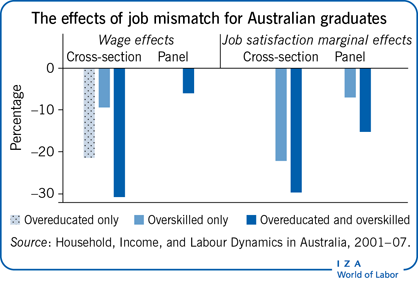Elevator pitch
Evidence shows that many college graduates are employed in jobs for which a degree is not required (overeducation), and in which the skills they learned in college are not being fully utilized (overskilling). Policymakers should be particularly concerned about widespread overskilling, which is likely to be harmful to both the welfare of employees and the interests of employers as both overeducation and overskilling can lead to frustration, lower wages, and higher quitting rates while also being a waste of government money spent on education.

Key findings
Pros
Many college graduates are employed in jobs that neither require a degree nor make full use of skills learned in college.
Empirical analyses based on cross-section data suggest that overeducation is a sign of market failure.
Empirical studies using cross-section data find a significant wage penalty and a reduction in job satisfaction for overeducated workers.
Studies using panel data indicate that the combination of overeducation and overskilling is most damaging to employees’ outcomes.
Cons
If overeducation is an investment in future earning power, mismatches are temporary and require no policy intervention.
Some people choose to work in jobs for which they are overeducated because they offer other non-financial benefits.
Panel data suggest no wage penalty for being overeducated or overskilled, and only a small penalty for those who are both, at least for men.
Overeducated workers find it easier to change jobs than overskilled workers or workers whose jobs and education are well matched.